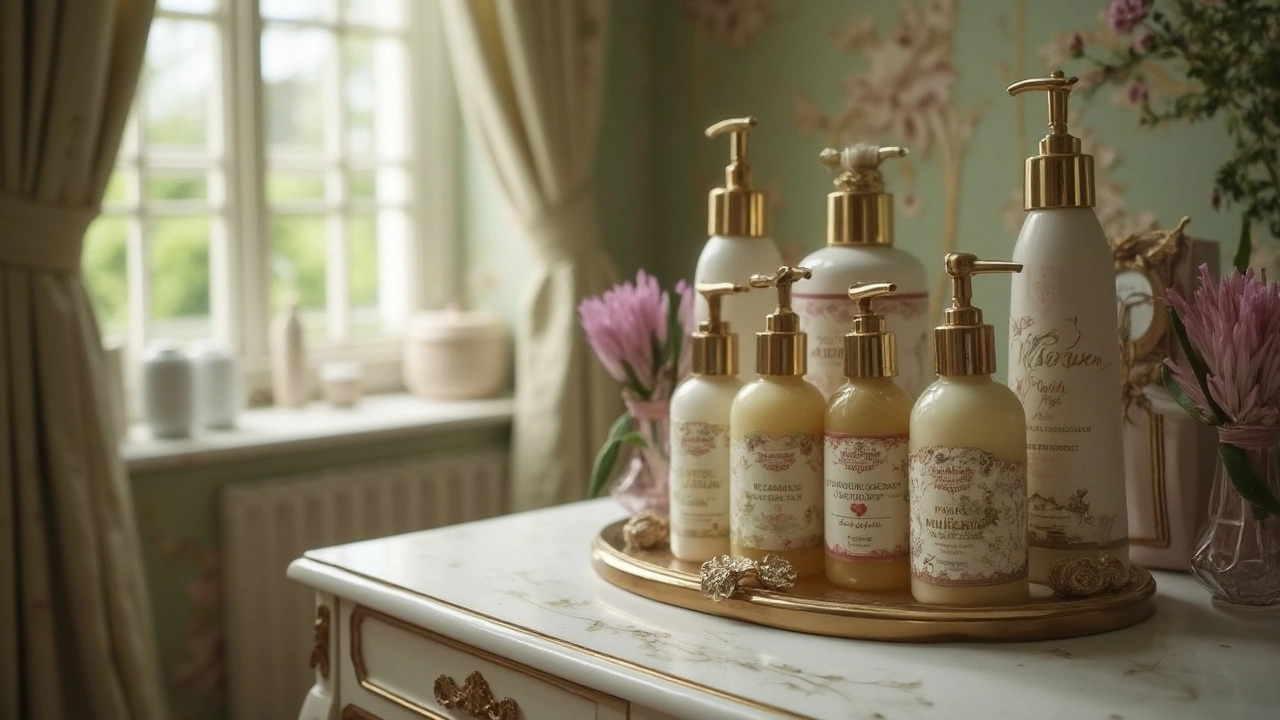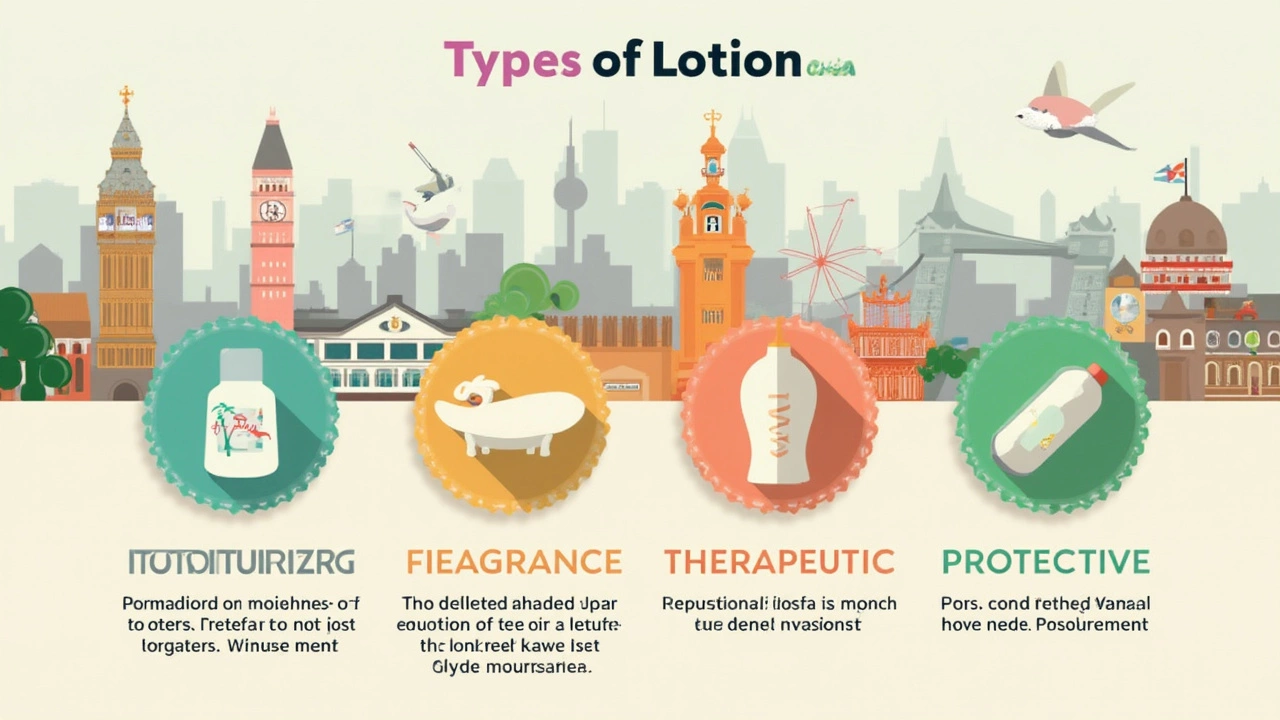Is Lotion Truly a Cosmetic Product?
 Apr, 3 2025
Apr, 3 2025
Alright, so you’ve probably used lotion before, but have you ever stopped to think if it really qualifies as a cosmetic product? It can be a bit confusing, and that's totally understandable! The world of cosmetics includes more than just makeup, and lotions certainly play a starring role in the skin care category. But what exactly makes something a 'cosmetic product' anyway? Let's break it down.
At its core, a cosmetic product is anything designed to be used on the body to clean, improve, or change your appearance. So yeah, that means lotions fit the bill! But there's a little more to it. Not all lotions are created equal. They can have different purposes, such as moisturizing, sun protection, or even helping with skin issues.
- Defining Cosmetic Products
- What Exactly is Lotion?
- Ingredients That Make Lotion Special
- Types of Lotions and Their Uses
- Lotion vs. Other Skincare Products
- How to Choose the Right Lotion for You
Defining Cosmetic Products
When we talk about cosmetic products, we're referring to a broad group of items that share a common goal: to enhance our appearance and keep us looking our best. According to the U.S. Food and Drug Administration, cosmetic products range from makeup like lipsticks and foundations to lotions and creams. But what exactly sets a cosmetic product apart?
Cosmetic products generally stick to these main purposes: cleansing the skin, improving its appearance, or changing how it looks and feels. So if you're slathering on your favorite lotion to keep your skin hydrated and smooth, you're using a cosmetic product, no doubt about it.
Here's some food for thought: the cosmetic industry is a massive powerhouse, pulling in billions of dollars every year. It's not just about looking good, but also feeling good, thanks to these products. For example, a study showed that more than 80% of consumers use skincare products, which includes lotions, as part of their daily routine.
Interestingly, while all lotions might sit under the cosmetic umbrella, not every lotion is the same. Some are hybrids with medicinal properties, like those with active ingredients aimed at treating skin conditions. This is where it gets a bit tricky, as those are more like drugs but still considered cosmetics when used for beauty purposes.
So, next time you reach for that bottle of lotion, know you're engaging with a product that's deeply rooted in the cosmetic world—and maybe even a little beyond.
What Exactly is Lotion?
Lotion is that creamy stuff in a bottle that most of us slather on our skin, but what is it, really? Essentially, it's a skincare product formulated to hydrate the skin. It’s usually a mix of oil and water, with added ingredients like fragrances or essential minerals. This blend helps in supplying moisture to our skin, preventing dryness, and even enhancing skin texture.
But not all lotions are created equal. They come in various formulations to cater to different skin types and needs. Some are light, almost liquid-like, perfect for oily skin, while others are thick and rich, ideal for dry skin. Have you ever noticed that some lotions claim to firm up your skin while others advertise adding a sun-kissed glow? That's because they contain special ingredients tailored for those effects.
Here's a fun fact: Lotions are often more than 50% water, which makes them super hydrating without feeling heavy or greasy. That's why they tend to absorb quickly, leaving the skin feeling refreshed. Plus, many lotions now include ingredients like aloe vera, vitamin E, and shea butter, adding more benefits to your skin routine.
If you're ever overwhelmed by the huge variety of lotions in the beauty aisle, just remember they all share a common goal—to make your skin look and feel fantastic. So, when you see a lotion next, it's not just another bottle on the shelf; it's a neat little package of moisture for your skin!
Ingredients That Make Lotion Special
If you're curious about what lifts lotion from being just some cream in a bottle to a skin savior, it's all in the ingredients. These tiny players work together to not only keep our skin looking good but also healthy.
First up, we have emollients. These are the stars when it comes to moisturizing. Emollients like glycerin and shea butter soften and smooth the skin by filling in tiny gaps. You can think of them as the spackle for your skin's small cracks.
Then there are humectants, which sound fancy but are pretty straightforward. They pull water from the environment into your skin. You'll often see ingredients like hyaluronic acid and urea doing this job. They help your skin stay hydrated and plump.
Next, we have occlusives. Now these guys are like a shield for your skin, stopping moisture from escaping. Common occlusives include ingredients like beeswax or petrolatum. Just like putting a lid on a jar, they keep the good stuff inside.
Often, lotions will also have some extras like vitamins or extracts. Things like Vitamin E or aloe vera give a bonus boost by offering nutrients or soothing actions. They can make a simple cosmetic product feel luxurious.
Here's a little fun fact for the curious minds:
| Common Ingredient | Purpose |
|---|---|
| Glycerin | Hydration through moisture retention |
| Shea Butter | Smoothing and softening |
| Hyaluronic Acid | Plumping effect by attracting water |
| Aloe Vera | Soothing and calming irritation |
| Vitamin E | Skin protection and healing |
So next time you slather on some lotion, you'll know exactly what's keeping your skin in tip-top shape. Choosing the right lotion isn't just about fragrance or texture—knowing what each ingredient does will help you find the perfect fit for your skin's needs.

Types of Lotions and Their Uses
Not all lotions are created equal, and that's great because it means there's something for everyone and every situation. Let's break down the most common types of lotion you might come across and what they're great for.
First up, we've got moisturizing lotions. These are your go-to for everyday hydration. They're packed with humectants like glycerin and hyaluronic acid that help your skin hold onto water. Perfect for tackling dry or flaky skin.
Next, we have sunscreen lotions. Yes, they're lotions that pull double duty by shielding your skin from the sun's harmful rays. Make sure to look for an SPF of at least 30 for decent protection. Dr. Jane Smith, a dermatologist, wisely notes,
"Using sunscreen lotions daily can significantly reduce the risk of skin damage and premature aging."
There's also a whole category of specialty lotions to handle specific skin issues. Got a lotion that has salicylic acid? That's made for acne-prone skin. And if you're dealing with eczema, lookout for lotions with ceramides or colloidal oatmeal.
- Baby lotions: Gentle and made for delicate skin. They usually skip out on harsh chemicals and fragrances.
- Self-tanning lotions: Who needs a beach when you have these? They offer a sun-kissed glow minus the UV exposure.
- Anti-aging lotions: Often loaded with ingredients like retinol and peptides to help with fine lines.
You might even come across a lotion that promises something a bit more niche, like firming or toning your skin. But remember, while they can be effective, they aren't magic potions.
Lotion vs. Other Skincare Products
When it comes to the world of skincare, there's a whole buffet of products to choose from. But how does lotion stack up against other options like creams, serums, or even oils? Understanding the differences can help you make the right choice for your skin.
First up, lotions are typically lighter than creams. They often have a higher water content, which makes them ideal for normal to slightly dry skin and daily use. Meanwhile, creams are richer and thicker, which makes them better for very dry or mature skin that needs extra hydration.
When you think of serums, think of concentrated magic potions. They’re packed with active ingredients and designed to target specific issues like aging or hyperpigmentation. Serums are your go-to for deep penetration and treatment, but they’re not substitutes for moisturizing, so pairing them with a lotion is a smart move.
Now, let’s talk about oils. They lock in moisture and create a barrier, which can be brilliant for dry skin. Just be cautious if you’re acne-prone—some oils can clog pores. But mixing a few drops of oil with your lotion can boost its hydrating power without weighing you down.
To put it in perspective, choosing a skincare routine is like picking a team. Each product has a role to play—and incorporating lotions, especially those with specific benefits like SPF or vitamins, makes sure you’ve got all bases covered.
How to Choose the Right Lotion for You
Picking the perfect lotion isn't as simple as grabbing the first bottle you see on the shelf. With so many options out there, it's important to find one that really works for your skin type and needs. Here’s how to get it right.
Know Your Skin Type: Understanding your skin type is crucial. Is your skin oily, dry, combination, or sensitive? Each type has different needs. For instance, those with dry skin may benefit from thicker, cream-based lotions, while oily skin types might prefer lighter, non-comedogenic formulas.
Check the Ingredients: A quick look at the ingredients can tell you a lot. If you're looking to hydrate, check for ingredients like glycerin, hyaluronic acid, or aloe vera. Got sensitive skin? Opt for products with less fragrance and additives.
Think About the Climate: Where you live matters too. Cold, dry environments often mean you'll need a more intense moisturizer, while humid areas might require something on the lighter side.
- Fragrance-Free Options: If you have allergies or sensitive skin, fragrance-free options are usually the way to go.
- SPF Protection: Want a multi-tasker? Lotions with SPF can protect your skin from sun damage while keeping it moisturized.
- Budget: There’s a lotion for every budget. Drugstore brands often work just as well as high-end products, so you don’t have to break the bank.
- Purpose: Are you looking for daily use, sun protection, or something to target conditions like eczema? Different lotions cater to different needs.
Here's a quick look at some common components in lotions and what they do:
| Ingredient | Function |
|---|---|
| Aloe Vera | Soothes and hydrates the skin |
| Vitamin E | Offers antioxidant protection |
| Shea Butter | Intensely moisturizes and nourishes |
Remember, trying out different cosmetic products can help you figure out what works best for you. It might take some experimentation, but once you find the right lotion, your skin will thank you!
